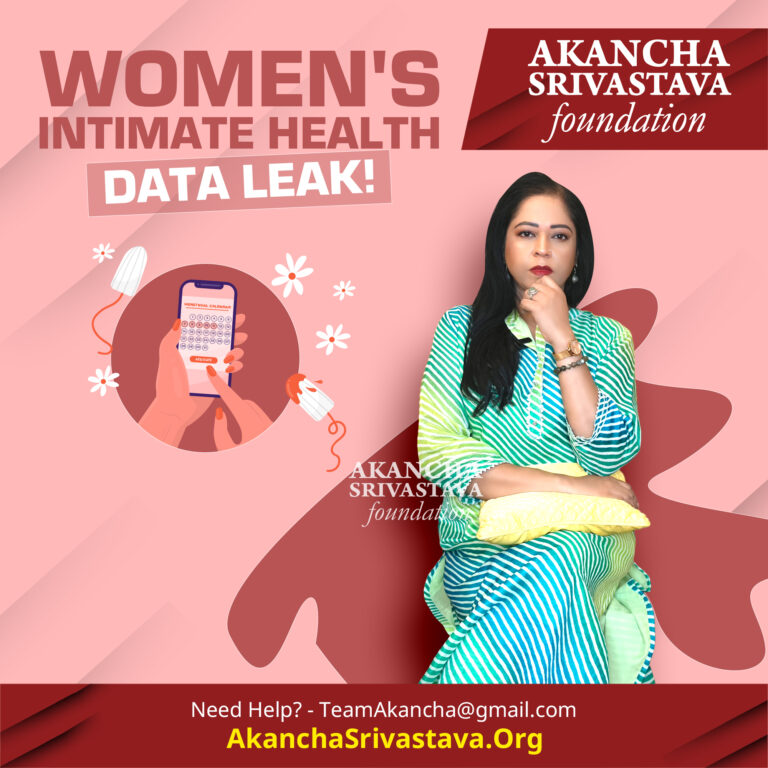Women, Your Most Private Data Isn’t Safe!
Millions of Indian women rely on period tracking and fertility apps to monitor their health—but behind the sleek interface lies a silent threat. These apps often collect far more than just cycle dates: they log sexual activity, mood, medication, contraception use, and even relationship status. What most users don’t realise is that this data can be—and often is—shared with third parties under vague terms disguised as “analytics” or “research.”
A 2025 MediaNama investigation citing experts from IIIT Delhi and SFLC India confirmed that many femtech apps collect excessive personal data without user awareness or proper consent. These apps operate with near-total impunity in India, bypassing data protection standards because there is no specific health data regulation for mobile applications targeting women. That legal silence is putting reproductive privacy at serious risk.
The issue isn’t just overcollection—it’s what happens next. Several apps embed third-party SDKs (software development kits) for analytics, which quietly send data like device IDs, location, behavioural patterns, and health logs to servers often located abroad. According to a 2025 University of Cambridge–led report, these data trails can be used to build behavioural profiles for targeted advertising—even political or insurance profiling. This is digital profiling of women’s bodies and choices, without transparency.
In Delhi, a user began receiving ovulation tracking ads, IVF offers, and hormone test kits days after logging a late period. In Pune, another woman was stunned to see baby product ads after using a pregnancy tracking app for just two weeks. These aren’t coincidences—they’re consequences of silent surveillance coded into apps that most users trust with their deepest personal information.
What’s more alarming is that some apps request access to contacts, photos, microphone, or storage—none of which are necessary for health tracking. Users grant permissions unknowingly, and once given, that data becomes fair game for usage beyond the stated purpose. The apps claim “anonymisation,” but security researchers have repeatedly proven that de-anonymised metadata can still be traced back to individual users—especially when combined with phone model, usage habits, and geo-behavioural data.
And in cases of data leaks or misuse, there is no legal remedy. India’s proposed Data Protection Bill is still pending full implementation. No regulatory framework mandates encryption, local storage, or user data deletion in femtech apps. There is no redressal body for women whose reproductive data is sold, leaked, or misused. This lack of protection leaves Indian women digitally exposed, despite growing use of such apps across cities and small towns alike.
What you must do now:
- Avoid apps that request unnecessary permissions like location, storage, or contacts.
- Use only apps withoffline mode, local data storage, or open privacy policies.
- Go to yourphone settings → App Permissions → Set location access to Never for health apps.
- Revoke background data access and block third-party tracking where possible.
- Never upload personal notes, photos, or identifiable data into any app without legal safeguards.
This is your health. Your body. Your privacy. Do not trust blindly. These apps may not leak blood—but they are leaking your data.
Subscribe to our channel, share this video, and help expose the silent exploitation of women through digital health apps.
🔔 Subscribe for more cyber safety insights!
👍 Like, share & comment to spread awareness!
Stay Aware, Stay Safe. Jai Hind, Jai Bharat.
CONTACT US:
Website: www.AkanchaSrivastava.Org
Email: TeamAkancha@gmail.com
Twitter: @AkanchaS
Instagram: @akanchas
https://www.instagram.com/akanchas/
Facebook:
https://www.facebook.com/akanchasrivastava1
LinkedIn:
https://www.linkedin.com/in/akanchasrivastava/
ABOUT ‘AKANCHA SRIVASTAVA FOUNDATION’
The Akancha Srivastava Foundation is India’s leading social impact initiative dedicated to advancing cyber safety awareness and education. Established in February 2017, this not-for-profit Section 8 organization is a trusted voice in promoting safe online practices across the nation.
Distinguished Board of Advisors
Guided by an honorary advisory board of esteemed leaders:
- Former Special DGP RK Vij (Chhattisgarh Police)
- ADG Navniet Sekera (Uttar Pradesh Police)
- ADG Krishna Prakash (Maharashtra Police)
- Dr. Poonam Verma (Principal, SSCBS, Delhi University)
Our Mission
The Foundation is committed to educating, empowering, and building bridges between the public and authorities on critical cyber safety issues. Additionally, we specialize in forensics training for law enforcement, equipping them with the skills needed to tackle cybercrime effectively.

